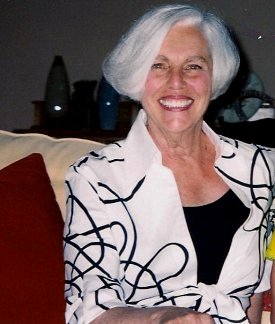Okay, I’ve trotted out this story before. However, it is the universal message in everyday stories like this that informs my own life and that is why this story speaks to me.
To begin with, it actually happened at Christmastime. Second, our smiling protagonist IS just that genuine in her intentions and her actions. That is not to say that she’s a hopeless Pollyanna; she’s not. She is hopeful despite the immoral realities that intrude upon our world.

“Pregnant with her first child at 22, [Susan Adams] assumed babies were born perfect. Her world was shattered when her daughter was born with a cleft palate and lip, failing kidneys and a defective heart. Adams set out on a voyage of learning that has lasted her whole life.
“Adams and her husband, Sam, had no money to pay the enormous bill that confronted them when they took their newborn home from the hospital. Santa Barbara’s St. Cecilia Society stepped in to pay their first medical bill, while friends and neighbors helped with babysitting and meals.
“The kindness of others defines who you are,” Adams said. “You never forget.”
“In the 1970s, as the number of homeless in Santa Barbara seemed to be increasing daily, Adams was one of the merchants affected by people lying on the sidewalks, discouraging customers. Confronted one morning by a homeless man blocking her store’s unlocked back door, she assumed the worst. She rushed in to check the cash register and was mortified to realize the man had, in fact, been guarding her store. She ran to thank him, but he was gone.
“Realizing that not everyone can be painted with the same brush, Adams joined the coalition lobbying to establish Casa Esperanza, a 24-hour shelter providing beds, showers, food and counseling for Santa Barbara’s homeless population.
“Adams’ daughter, Wendy, died of heart failure at age 34, just after advising her mother to consider leaving retail in favor of community service. Adams did just that. She served on the boards of Transition House, Hospice of Santa Barbara and the Visiting Nurse Association of Santa Barbara, and helped organize a holiday party for homeless and battered women and their children.
“When Sam Adams was diagnosed with Alzheimer’s at 54, she took care of him, taking him to board meetings until she had to devote herself full time to his care.”
What separates Sue Adams from others is this simple fact: where others focus on the problem, Sue focuses on the solution. So, in honor of Sue, and her 1,000 watt smile, I offer my own first-hand account of “A Sue Adams Christmas.”
Much of the time we tend to think of compassion in terms of the extraordinary moments, events which seem removed from our daily perspective. The Dalai Lama’s story of a Tibetan monk’s compassion towards his Chinese jailers is one example. However, not long ago, I experienced a simple, yet powerful example of everyday compassion.
My neighbor, Sue Adams, is funny, wise and wonderful. Gifted with a sincere desire to help others, Sue has not only worked with community leaders and philanthropists to get the means and the methods implemented for a newly renovated homeless center, but she also works in countless individual ways that make a difference.
I never realized this more clearly than the other night when my wife and I were having dinner at a local restaurant along with Sue and some friends. Halfway into our meal, a confused and careworn woman was wandering around looking for her purse. When I tried to help her in locating the manager, she defensively pulled away. Sue walked with the woman and talked to her. Her words clearly had a calming effect.
Sue called the center and made arrangements to have the woman spend the night. She then left her dinner, and with the help of another friend, drove the woman to the shelter. She returned in time to watch us all finish our dessert. When we encouraged her to order something more, she simply made a joke that the abbreviated meal fit with her diet plans. We all laughed but took notice of yet another example of individual compassion.
At the end of It’s a Wonderful Life, George Bailey realizes that he had a pretty wonderful life not because his accomplishments were on a grand scale, but because they were on an individual level that touched the lives of so many. “This is why compassionate thought,” the Dalai Lama reminds us, “is so very important for humankind.”
Sue Adams is that compassionate thought in action, and our community is all the richer for it.
Comments










